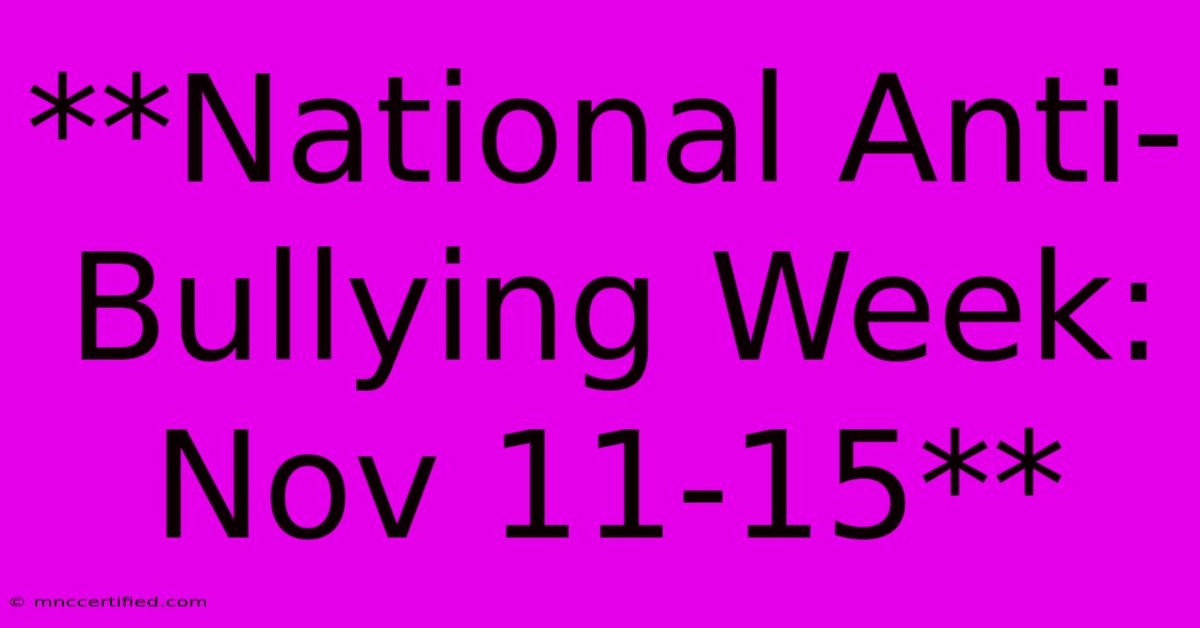**National Anti-Bullying Week: Nov 11-15**

Table of Contents
National Anti-Bullying Week: A Time to Stand Up, Speak Out, and Create a Safer World
National Anti-Bullying Week, observed annually from November 11th to 15th, is a critical time to raise awareness about the devastating effects of bullying and promote positive change. It's a call to action for everyone – individuals, schools, communities, and organizations – to join the fight against bullying and create a safer, more inclusive environment for all.
Understanding the Impact of Bullying
Bullying is a pervasive issue that can have long-lasting consequences on its victims. It goes beyond physical harm, encompassing emotional, verbal, and social abuse that can lead to:
- Mental health issues: Depression, anxiety, low self-esteem, and suicidal thoughts.
- Academic difficulties: Decreased academic performance, absenteeism, and school avoidance.
- Social isolation: Difficulty building and maintaining relationships, leading to social withdrawal.
- Physical health problems: Headaches, stomachaches, and sleep disturbances.
National Anti-Bullying Week: A Time for Action
National Anti-Bullying Week presents an opportunity to take concrete steps towards a bullying-free world. Here are some ways you can participate:
1. Educate Yourself and Others:
- Learn about different types of bullying: Physical, verbal, cyberbullying, relational aggression, and more.
- Understand the warning signs of bullying: Changes in behavior, mood swings, physical injuries, and reluctance to go to school.
- Share resources and information: Spread awareness about bullying prevention programs and support services.
2. Promote Kindness and Inclusivity:
- Practice empathy and compassion: Treat others with respect and understanding.
- Challenge negative stereotypes and prejudice: Encourage acceptance of diversity and celebrate differences.
- Stand up for others: Be an ally and speak out against bullying when you witness it.
3. Support Victims of Bullying:
- Listen without judgment: Offer a safe space for victims to share their experiences.
- Believe their stories: Validate their feelings and experiences.
- Encourage them to seek help: Provide information about resources and support networks.
4. Empower bystander action:
- Teach others about the role of bystanders: Emphasize that inaction can be harmful.
- Provide strategies for intervening safely: Offer options like distraction, direct confrontation, or reporting to trusted adults.
- Promote a culture of positive bystander behavior: Encourage students and community members to be upstanders rather than bystanders.
5. Engage in community initiatives:
- Support anti-bullying organizations: Volunteer time or donate to organizations working to combat bullying.
- Attend community events: Participate in workshops, rallies, and awareness campaigns.
- Advocate for policy changes: Support legislation that addresses bullying prevention and intervention.
National Anti-Bullying Week: A Collective Responsibility
National Anti-Bullying Week is a reminder that we all have a role to play in creating a world free from bullying. By promoting kindness, empathy, and understanding, we can empower individuals, build stronger communities, and ensure that everyone feels safe, valued, and respected.
Keywords: National Anti-Bullying Week, bullying, anti-bullying, bullying prevention, bullying awareness, kindness, inclusivity, empathy, bystander intervention, upstanders, community initiatives, mental health, support services, resources.

Thank you for visiting our website wich cover about **National Anti-Bullying Week: Nov 11-15**. We hope the information provided has been useful to you. Feel free to contact us if you have any questions or need further assistance. See you next time and dont miss to bookmark.
Featured Posts
-
How To Watch Ny Giants Vs Panthers Nfl Munich
Nov 11, 2024
-
Are Skin Checks Covered By Insurance
Nov 11, 2024
-
Sundays Game Conklin Listed Active
Nov 11, 2024
-
49 Years Ago The Loss Of The Edmund Fitzgerald
Nov 11, 2024
-
1992 Portos Win Northern Footballs Turning Point
Nov 11, 2024